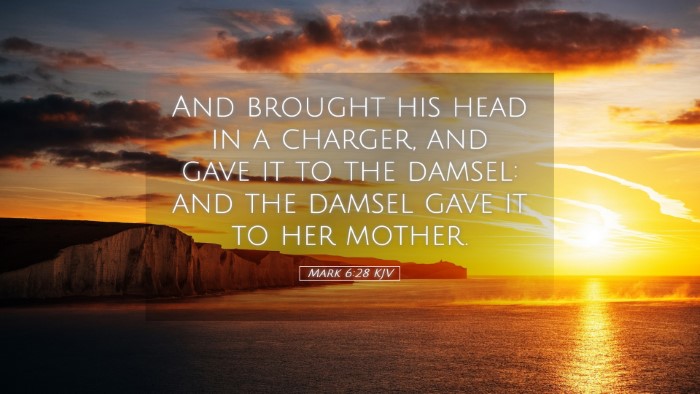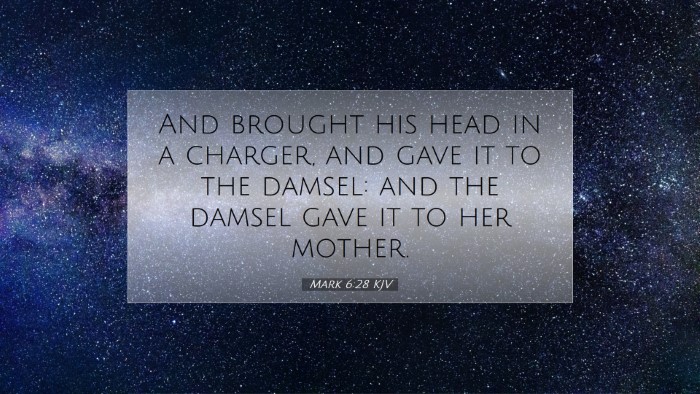Commentary on Mark 6:28
Mark 6:28 recounts the tragic event surrounding the death of John the Baptist. The verse states:
"And brought his head in a charger, and gave it to the damsel: and the damsel gave it to her mother."
Contextual Background
Historical Context: This verse occurs within the account of Herod Antipas, who had imprisoned John the Baptist largely due to John's condemnation of Herod's marriage to Herodias, his brother's wife. John’s steadfastness in preaching against sin ultimately led to his martyrdom, which illustrates the severe consequences of moral convictions in a corrupt society.
Insights from Public Domain Commentaries
Matthew Henry's Commentary
Henry emphasizes the grim nature of this event, depicting it as a culmination of Herodias' vindictiveness. He notes:
- Moral Consequences: The act of beheading John illustrates the moral decay of Herod's character. Herod was not a man of conviction; rather, he succumbed to the whims of others, particularly the manipulations of Herodias.
- Role of the Woman: The young girl, likely Salome, played a pivotal role in this narrative. Her actions, driven by her mother's desire for revenge, highlight how innocence can be corrupted by malicious intent.
Albert Barnes' Notes on the Bible
Barnes provides a more analytical approach to the motivations behind Herod's actions:
- Fear of Man: Herod's decision to execute John stems from his fear of publicly going against the desires of those around him. Barnes points out that Herod feared losing face among his guests more than he feared divine judgment for killing a prophet.
- Public Opinion versus Righteousness: The narrative serves as a warning about the dangers of allowing public opinion to dictate one’s actions, especially in matters of faith and morality.
Adam Clarke's Commentary
Clarke offers a theological interpretation, diving deeper into the spiritual implications of this act:
- John's Prophetic Role: He emphasizes that John's death was a fulfillment of prophecy and indicative of the rejection of God's truth, which continues to resonate through time as God's messengers are often met with hostility.
- Symbolism of the Head: Clarke also points out that the head of John, brought on a platter, symbolizes the silencing of truth in the midst of power plays, a scenario that can be seen throughout history where the righteous are oppressed by the wicked.
Theological Reflections
From both the historical and theological perspectives, Mark 6:28 serves as a profound reminder of the cost of discipleship. Here are key aspects for reflection:
- Cost of Witnessing: Followers of Christ are called to bear witness, understanding that proclaiming truth can lead to personal sacrifice. This narrative demonstrates that standing for righteousness may provoke hostility.
- Divine Justice: While Herod and Herodias appeared to triumph temporally, believers can find assurance that God’s justice prevails eternally. The martyrdom of John serves as a testament to the faithfulness of God amidst human action.
Practical Implications for Pastoral Ministry
For pastors and church leaders, this account challenges the church to:
- Preach Boldly: Encourage congregants to speak truth within their spheres of influence, despite the potential for backlash.
- Cultivate Discernment: Foster a spirit of discernment among believers, emphasizing the need to distinguish between worldly values and divine commandments.
- Honor the Martyrs: Recognize those who have suffered for their faith, creating awareness among congregants about the spiritual authority gained through the sacrifices of righteous individuals.
Conclusion
Mark 6:28 is more than just a historical recount of John's unjust execution; it serves as a deep reflection on the nature of power, the cost of truth, and the response of believers in a world that often opposes divine principles. The insights provided by esteemed commentators illuminate the richness of this verse and its implications for our lives, urging us to uphold truth despite the risks it may entail.


